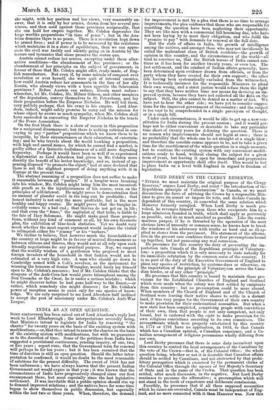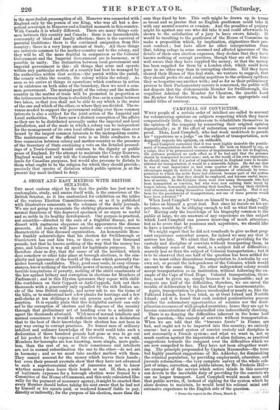LORD DERBY ON THE CLERGY RESERVES.
"EITHER we must maintain the original purpose of the Clergy Reserves," argues Lord Derby, and resist "the introduction of the
Republican principle of Voluntaryism" in Canada, or we must discontinue the farce of advising the Crown by a responsible Min- ister to give its assent or impose its veto, and declare Canada in- dependent of this country, in somewhat the same relation which Hanover formerly occupied. When Lord Derby is much pro- voked, he revenges himself upon those who exasperate him by a large admission founded in truth, which shall apply as perversely as possible, and do as much mischief as possible. Like the contu- macious pauper, if he is thwarted by the operation of the most obvious laws of necessity or common sense, he knows how to break the windows of his adversary with truths as hard and as ill-ap- plied as stones from the pavement. His statement of the alterna- tive in the present case combines three or four presumptions bound up together, but not possessing any real connexion. He presumes for this country the duty of preventing the im- portation into Canada of the Republican principle of Voluntary- ism : a proposition which it is only necessary to state nakedly for its immediate refutation by the common sense of the country. It is no part of the duty of the Executive Government of England to place any species of restriction, by customs-dues or otherwise, on the importation of the principle of Voluntaryism across the Cana- dian border, or of any other "principle." He presumes that this country is bound to maintain those pro- visions for the Established Churches of England and Scotland which were made when the colony was first settled by emigrants from this country : but no presumption could be more absurd. When members of the Church of England and of the Church of Scotland were leaving their native shores to settle in a distant land, it was very proper for the Government of their own country to make provision for their ecclesiastical necessities. But when a new state has been completed, comprising people with convictions
of their own, then that people is not only competent, not only bound, but is endowed with the right to make provision for its own religious convictions according to its own conscience. The arrangements which were properly entertained by this country in 1774 or 1791 have no application, in 1853, to that Canada which has a Canadian opinion, a Canadian conscience, and a Ca- nadian arrangement of religious persuasions wholly differing from our own.
Lord Derby presumes that there is some duty incumbent upon this country to control the local arrangements of the Canadians by the veto of the Crown—that is, of the Colonial Office; the whole question being, whether or not it is desirable that Canadian affairs should be settled by Canadians, and not obstructed by that prohi- bitory prerogative which is exercised by the permanent clerks of the Colonial Office through the agency of her Majesty's Secretary of State and in the name of the Crown. That question has been. settled, after much discussion, in the negative. But Lord Derby continues to presume the affirmative ; a presumption which will not stand in the teeth of experience and deliberate conclusions.
Fourthly, he presumes that if all these supposed necessities which he raises are overruled, Canada must be independent of Eng- land, and no more connected with it than Hanover was. Now this
is the most foolish presumption of all. Hanover was connected with England only by the person of our King, who was all but a des- potical sovereign in H_anover and a limited monarch in this country. With Canada it is wholly different. There are many things com- mon between this country and Canada : there is no inconsiderable community of blood and family affection ; there is the survival of parental traditions; there is the continued emigration from this country; there is a very large amount of trade. All these things are interests common to the mother-country and to the colony, and they will be all the more fruitful in comparison as the Colonial Government and the Imperial Government are in harmony, or if possible in unity. The distinction between local government and imperial government is this: all things that arise and operate within any particular section of a country had best be managed by the authorities within that section—the parish within the pariah, the county within the county, the colony within the colony. As soon as we arrive at things or operations which continue in action or in existence on both sides of the boundary, then we need a com- mon government The mutual profit of the colony and the mother- country in the matter of trade will be promoted in proportion as the intercourse between them is absolutely free; as in a canal between two lakes, so that you shall not be able to say which is the water of the one and which of the other, or where they are divided. The re- venue needed to support the government ruling over those common interests is also a subject for the joint action of the Imperial and Local authorities. We have now a distinct conception of the affairs as they are to be distributed severally under the imperial and local jurisdiction, and of the mode in 'which a colony can be independent for the management of its own local affairs and yet more than ever bound by the largest common interests to the metropolitan centre. The maintenance of the official veto is as little conducive to a true connexion between colony and mother-country as the presence of the Secretary of State exercising a veto on the detailed proceed- ings of a Town-Council would conduce to the dignity or public peace of England. By the attempt to maintain the Clergy Reserves, England would not only tell the Canadians what to do with their lands for Canadian purposes, but would also presume to dictate to them what ought to be the religion for which they should provide; precisely that species of dictation which public opinion is at the present day most inclined to deny.

























 Previous page
Previous page